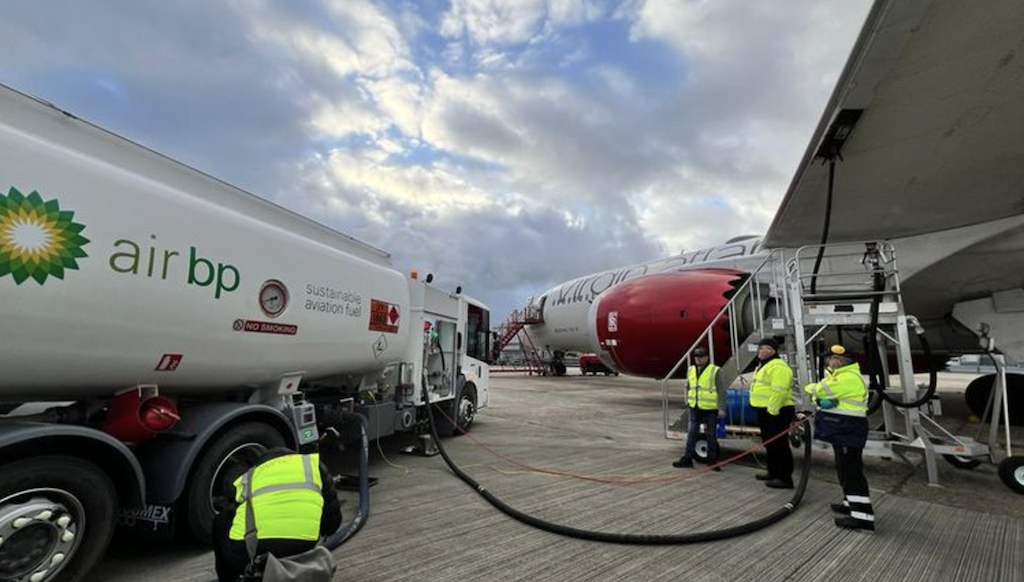Taskforce replaces Council on the Jet Zero mission towards cleaner aviation
Government has launched refreshed plans to tackle aviation emissions by establishing the Jet Zero Taskforce to chart a clear path toward cleaner aviation.
Members will include the Secretary of State for Business and Trade Jonathan Reynolds, Secretary of State for Energy Security and Net Zero Ed Miliband, CEOs of major airlines, such as easyJet and Virgin, airports like Heathrow and Manchester, as well as fuel producers, trade bodies and leading universities.
Building on the previous Jet Zero Council, the Taskforce will support the production and delivery of sustainable aviation fuels (SAF) and zero emission flights, as well as look at how to improve aviation systems to make them more efficient.
It will also explore the sector’s demand for greenhouse gas removals and the non-CO2 impacts of aviation, such as vapour trails left in the sky, to account for the sector’s overall environmental impact.
Secretary of State for Transport, Louise Haigh, speaking before her sudden resignation last week said, “Climate change is one of the biggest challenges we face, and together with industry, I am determined to build an aviation sector that’s future-ready and better for the planet.
“We need to make flying a cleaner, greener experience and the new and improved Jet Zero Taskforce will be the driving force behind this transition. I look forward to working with all members to deliver meaningful changes that will boost our economy and make the UK a global leader in sustainable travel.
CEO of Airlines UK, Tim Alderslade said, “The UK can lead the way in net zero aviation, ensuring our world-class aviation and aerospace companies can continue to support a growing UK economy and industrial base and provide families the chance to travel long into the future. Collaboration with government and across the whole sector and supply chain is vital to making the rapid progress we need and to help usher in a new era of sustainable air travel, with all the jobs and investment that entails.”
Set to meet for the first time in early December, sustainable aviation fuel (SAF) and creating a strong, resilient UK SAF industry will be high on the agenda.
In November, the SAF Mandate was officially signed into law, requiring an increasing amount of SAF in overall jet fuel from 1 January 2025. By 2040, 22% of all jet fuel must come from sustainable sources – whether that be from household waste or by using new power-to-liquid technology.
Chief Executive of AirportsUK, Karen Dee said, “This Taskforce, which will build on the work of the previous body, will continue to ensure government and industry collaborate to deliver on our net zero carbon commitments and that future aviation is sustainable.
“The UK is positioned well to take advantage of the entirely new sectors that sustainable aviation will create, generating new jobs and economic growth while reducing emissions from international travel.
“UK airports are already doing a lot to reduce their carbon emissions, from electrifying vehicles, generating their own renewable energy and greening terminal operations, and this group will continue to help identify and eliminate obstacles to further progress.”
Supporting the executive level will be a smaller, focused expert group of sustainability leaders to support the Taskforce’s priorities. Chaired by Mike Kane MP, Minister for Aviation, Maritime and Security, and Holly Boyd-Boland, VP of Corporate Development at Virgin Atlantic, it will be tasked with pinpointing key barriers to decarbonisation and directing a select number of smaller action groups to tackle challenges crucial to the delivery of the Taskforce’s objectives.
VP of Corporate Development at Virgin Atlantic, Holly Boyd-Boland said, “Decarbonising our sector requires radical collaboration – a shared goal, underpinned by a bias to action. Aviation can play a significant role in delivering the government’s missions for economic growth and clean energy. I look forward to working alongside government, with its renewed focus and leadership of the Jet Zero Taskforce. Together, we can harness the ambition across industry to achieve net zero 2050.”

